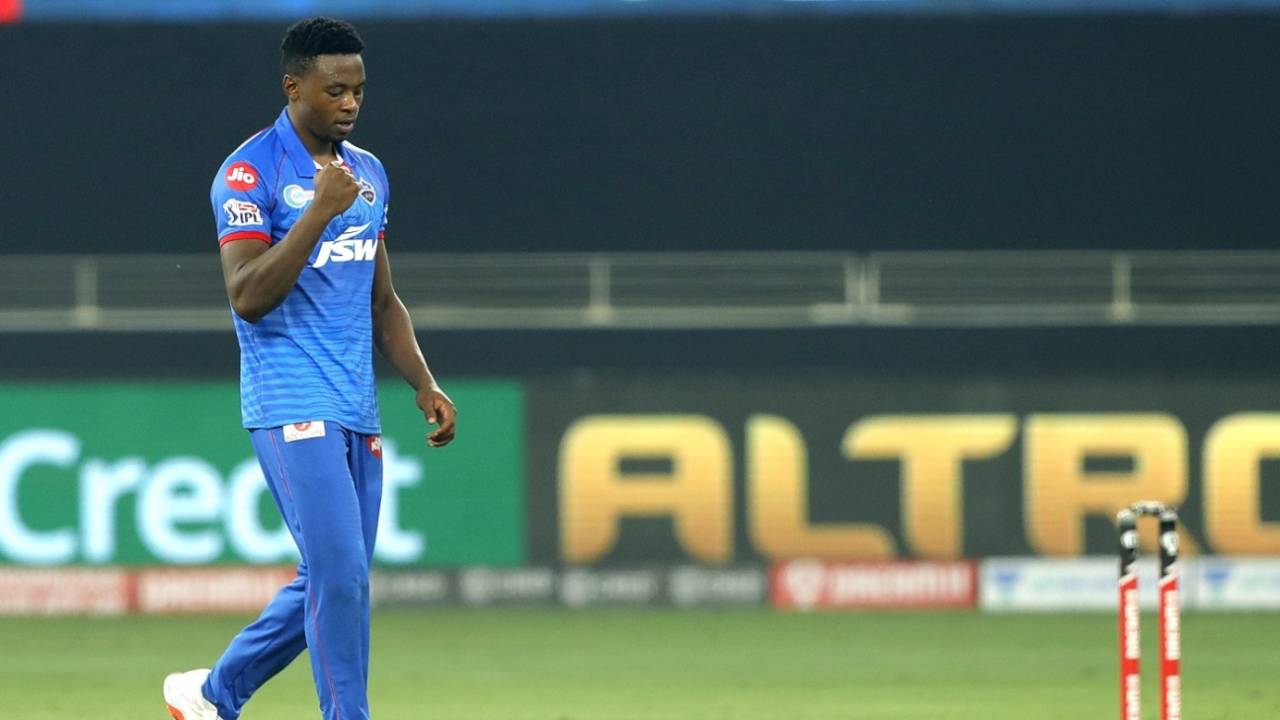IPL 2020: Delhi Capitals' Kagiso Rabada shares the secret behind his Super Over success
Rabada has bowled nine Super Over deliveries in the IPL. Off them, he has conceded only nine runs while taking three wickets
Saurabh Somani
22-Sep-2020
Kagiso Rabada celebrates a wicket • BCCI
Kagiso Rabada is one of only two bowlers to have bowled two Super Overs in the IPL, alongside Jasprit Bumrah. Not coincidentally, both times they bowled a Super Over, their teams won the match.
Rabada's Super Over record reads: nine balls bowled, nine runs given, and three wickets taken. Three very impressive wickets too, in Andre Russell, KL Rahul and Nicholas Pooran.
The conditions and batsmen dictated Rabada's choice of bowling plans in each Super Over. While he went for yorkers to Russell and Dinesh Karthik at the Feroz Shah Kotla in Delhi in 2019, the Dubai International Cricket Stadium called for different tactics as he faced up to Rahul and Pooran on Sunday night, in IPL 2020.
"It just depends what's working for me on the day, and getting a feel for what might work as well," Rabada said of the match against Kings XI Punjab. "It differs… today was just mixing the lengths up and luckily it helped. Sometimes it doesn't go for you, sometimes it does."
Rabada finished the contest in three balls, giving the Capitals just three runs to chase in their own Super Over. His first ball was to Rahul, full and tailing into him. The second one was a scorching short one bowled into the batsman who was backing away. Rahul went for a pull while off-balance and was caught at deep square leg. With Pooran perhaps hanging back due to the effectiveness of the earlier short one, Rabada bowled his third ball full and fast on off, zipping past an attempted slog to take out the stumps. The second ball, which got Rahul's wicket and also set up the third, happened because Rabada sussed the conditions well.
"There was also decent bounce in this wicket, and the boundaries are quite big so it's going to take a good hit to clear it," he said, explaining why he went for the short ball. "So I just backed myself with the extra pace and bounce, so that hopefully he doesn't hit it over the fence (laughs). It was a bit of a gamble.
"I don't plan to win, but instead I plan to execute to win, and I think I managed to do that well in the Super Over," Rabada later told the Delhi Capitals media team. "That's just the way a game of cricket goes. Honestly, it was a big relief because I knew if I did that, and with the kind of batters we have, three runs to win, we could do that. I was just very relieved that I took the wicket and could help the team in winning."

Kagiso Rabada uprooted Andre Russell's middle stump•BCCI
The change in tactics for Rabada - despite the yorker plan bringing him great success against T20 cricket's most fearsome hitter in Russell a year ago - was also a marker of his evolution as a bowler. Rabada's planning stems from having a 'feel' for the moment and the match, an instinct that itself has been developed by experience. "It just about the feeling. And the way you read the game. There are many ways to get the job done. You will be criticised if you don't get the job done - whether you bowl slower balls or yorkers," Rabada had told The Cricket Monthly last year, after his first Super Over.
And that reading of the game told Rabada that despite the yorker being among the best options for a Super Over, and one he was proficient at, he could mix his lengths up this time around.
Unlike last season, when Delhi Capitals could choose between Chris Morris and Rabada for the Super Over against Kolkata Knight Riders, it was clear from the outset that Rabada would have the ball for the Super Over against Kings XI. He was the Capitals' best bowler on the night too, even if conventional figures might not portray that, and the team were right to trust him.
Rabada had 2 for 28 in four overs during the regular match play, but ESPNcricinfo's Smart Stats helps see why Rabada was clearly the Capitals' best choice. His Smart Economy rate - adjusted for the phases in which a bowler bowls and the opposition's position - was a superb 5.84, while his Smart Wickets tally was 2.51, because he not only got Glenn Maxwell cheaply but also came back to stop K Gowtham, who was leading a late charge for the Kings XI. That meant Rabada's bowling impact was the best among the bowlers the Capitals had at their disposal, better than even Axar Patel, who conceded half the runs Rabada did in returning 4-0-14-1.
The data backed up the cricketing decision to throw the ball to Rabada for the Super Over. And he validated that faith in just three balls.
Saurabh Somani is an assistant editor at ESPNcricinfo
